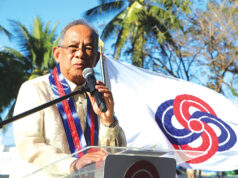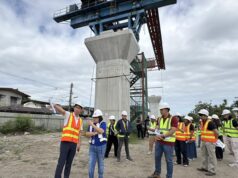MASINLOC, Zambales — Aside from safe access to traditional fishing grounds like Bajo de Masinloc or Scarborough Shoal, Zambales fishermen also need a level playing field so they can compete with foreign fishers that venture into the West Philippine Sea, said Gov. Hermogenes Ebdane Jr.
By this, Ebdane noted, local fishers should be able to acquire bigger boats and better fishing equipment, and, in face of the security problem at Bajo de Masinloc, find alternative fishing grounds where they can continue to ply their trade safely.
The Zambales governor stressed this at the public consultation conducted here on Friday by the House of Representatives’ Committee on National Defense and Security and the Special Committee on the West Philippine Sea to examine the impact to local fishermen of Chinese incursion into the Scarborough Shoal.
Fishermen who attended the dialogue said they have not received any assistance from the national government ever since they faced bullying from Chinese militia boats at the Scarborough Shoal.
Ebdane, a former defense secretary, pointed out that while the situation at the shoal has socio-economic, political, and security implications, the welfare of local fishermen is a primary concern.
He stressed that while the Philippines has won in the arbitration case over the Scarborough Shoal, the ruling was not acknowledged by China, thus rendering it unenforceable. “So, there has to be an alternative to this problem in Bajo de Masinloc,” he added.
Ebdane said that as far as local fishermen are concerned, the Zambales government has short- and long-term programs in place to address their needs, and has set the stage for sustainable fishing by putting up millions in funds for fisherfolk to go into payao fishing, a system that uses fish aggregating devices in open sea.
“We’re laying the foundation to ensure development and progress for the next generation of fishers,” he said, adding that the long-term program starts with reorganizing fisherfolk into cooperatives to qualify for financing, followed by training and apprenticeship to ensure they are ready to undertake the project.
Ebdane added that the provincial government is teaming up with local educational institutions, including the Philippine Merchant Marine Academy, to train the youth in new fishing technologies, as well as fishing boat operations, to provide “a better foundation” for fisherfolks.
Citing a recent survey indicating some 65 fishermen’s groups in the province, with about 4,500 members, Ebdane said: “They can already get a big fishing boat with P1.5 million, and we can provide that at no interest.”
“There is really a big problem when our fishermen cannot access Bajo de Masinloc,” Ebdane observed. “Worse, if they remain doing marginal fishing, then they become a problem to local government units because we have to dole out food or cash assistance every time they cannot go out to fish.”
The recent threat by China to detain “trespassers” at the South China Sea is another concern that must be addressed within the parameters of international law, he added.
In Friday’s hearing, Rep. Dan S. Fernandez of the lone district of Sta. Rosa, Laguna observed that the problem of limited access to Scarborough is exacerbated by the use of outdated fishing gears and technology.
“We have to evolve,” he said. “If our fishermen would continue to use small traditional boats, they would really be in a dangerous situation.”
Ebdane said a fishers’ cooperative in the town of Sta. Cruz would be the first group to avail itself of the provincial government’s assistance to modernize their fishing boat and equipment.
In a dialogue with local fishers last March, the governor said fishers’ groups can avail themselves of financial support starting at P5 for fishing implements, including payaos. He added that to own and operate bigger boats would entail about P60 million, a sum which can be made available to fishermen here, he said, depending on their developed expertise and capability.





